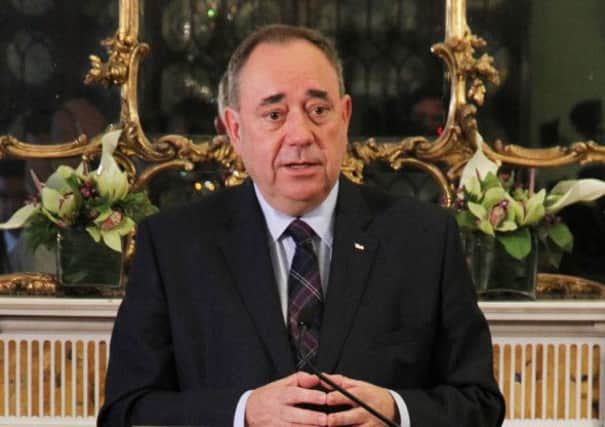Salmond goes as calls for English-only votes mount


Mr Salmond drew an end to seven years as Scottish First Minister after voters backed the No campaign by 55 per cent to 45 per cent for the Yes side.
The SNP veteran said it was time for new a leadership to hold politicians at Westminster to account for the promises they made to Scotland during the course of the campaign.
Advertisement
Hide AdAdvertisement
Hide Ad“My time as leader is nearly over, but for Scotland the campaign continues and the dream shall never die,” he said.
Mr Salmond’s decision came as the Prime Minister faced up to a hugely difficult constitutional balancing act created as part of his vow to devolve far greater spending and taxing powers to Scotland
In a day of fast-moving political developments, Mr Cameron said he would push for a change in the law to ban Scottish MPs from voting in Westminster on issues which Scotland already has devolved powers over.
That would leave Labour effectively facing the day-to-day loss of at least 40 MPs, prompting party leader Ed Miliband to say the issue should be delayed until a Constitutional Convention could take views from across the UK on devolution for both Scotland and the English regions.
Advertisement
Hide AdAdvertisement
Hide AdBut while Labour has hinted that it could delay Scottish devolution if the Prime Minister insists on linking devo-max to changes in how Scottish MPs vote in the Commons, Mr Cameron’s own backbenchers have told The Yorkshire Post they will only back him if Scottish MPs are kept out of issues that do not affect them. While politicians argued over the newly created constitutional crisis, the Queen issued a statement in which she hailed Scotland’s “robust democratic tradition”.
She also said she has no doubt the Scottish people and the rest of the UK will “work constructively for the future of Scotland and indeed all parts of this country”.
Following a campaign that galvanised all of Scotland, Mr Cameron vowed that promises made by the three main Westminster parties to devolve more powers to Holyrood would be “honoured in full”, with draft legislation in January.
But speaking on the steps of Downing Street, he made clear that they would go hand in hand with a “balanced” new constitutional settlement covering England, Wales and Northern Ireland.
Advertisement
Hide AdAdvertisement
Hide AdAt the same time there were continuing calls for the Government to set out just how it will devolve power down to English regions and cities.
Last night a leading economist stepped into the devolution debate, saying Yorkshire cities must prove they are ready to wield greater powers.
Jim O’Neill, the former chief economist at banking giant Goldman Sachs and the chairman of the City Growth Commission, told The Yorkshire Post: “The key is, it is up to the cities to prove they have the governance arrangements to warrant the responsibilities.”